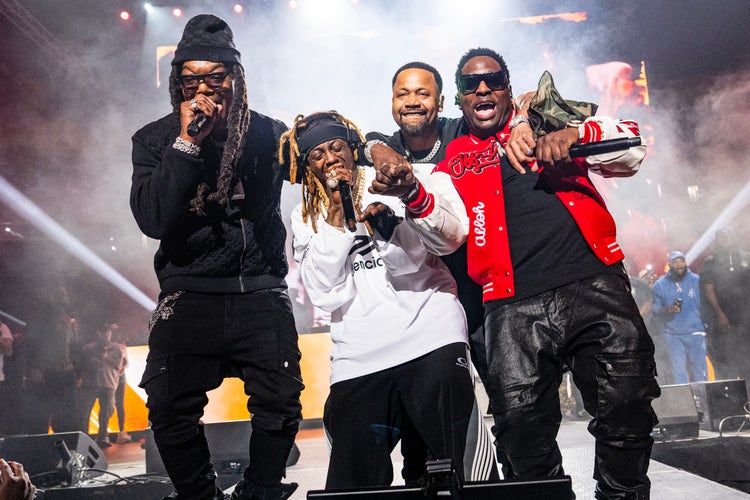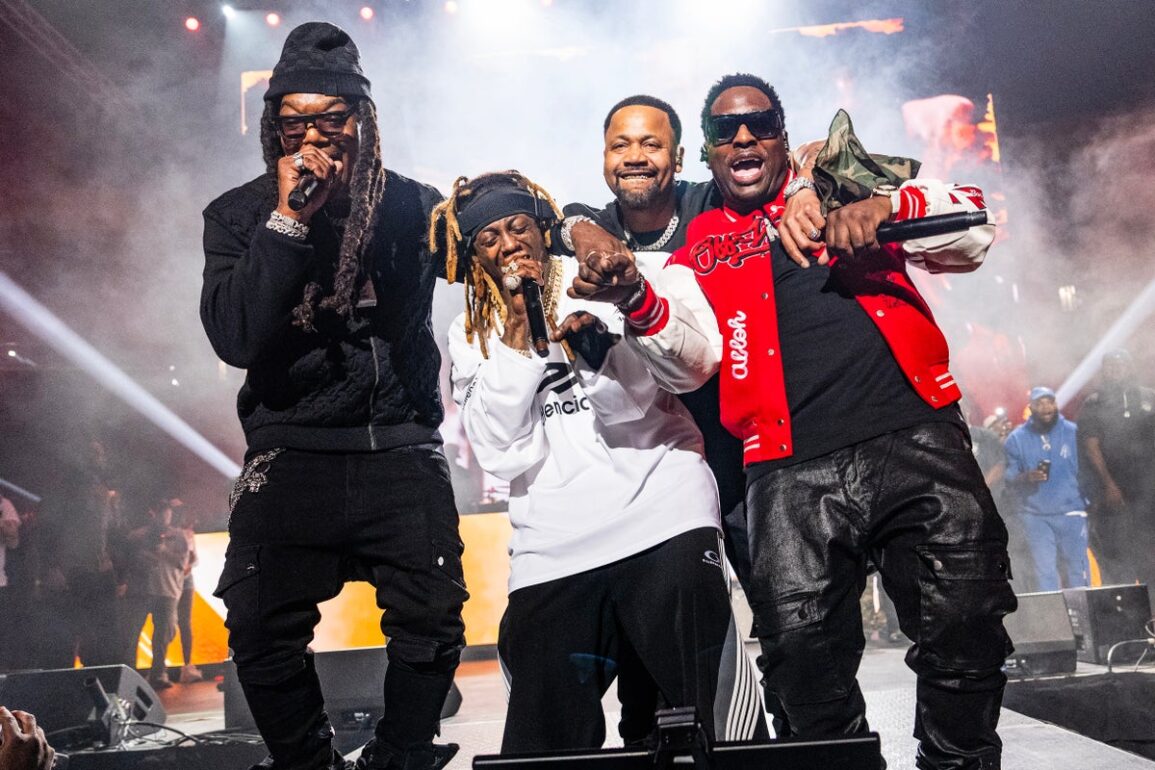Image

Image Credit
Erika Goldring / Contributor via Getty Images
Image Alt
B.G, Lil Wayne, Juvenile, and Turk
Image Size
landscape-medium
Image Position
top
New Orleans is a city rich in culture, rhythm, and resilience, a place where music is deeply woven into the fabric of daily life. Known for its jazz, blues, and bounce music roots, the city also birthed some of the most influential rappers in the history of Hip Hop, blending its unique sounds with fresh, innovative styles. From the hard-hitting beats of Master P and the No Limit Records era to the lyrical depth of Lil Wayne, NOLA artists have brought the city’s vibrant culture and distinctive rhythms to the world stage. These pioneers not only shaped the sound of Southern Hip Hop but also introduced elements of New Orleans’ street life, Mardi Gras traditions, and social consciousness into their music. Whether through the party-ready bounce music or the deeply personal storytelling of their lyrics, New Orleans rappers have left a lasting mark on the genre, influencing countless artists and shaping the direction of modern Hip Hop. Here are the New Orleans rappers who put their city on the Hip Hop map and continue to inspire generations today.
1. Lil Wayne
Lil Wayne is not just New Orleans’ greatest rapper — he’s one of the most influential artists in Hip Hop history. Starting as a teen in the Hot Boys, Wayne showcased his talent early on before cementing himself as a solo superstar with albums like Tha Carter series. Tracks like “A Milli” and “Lollipop” became cultural anthems, showcasing his versatility and wordplay. As the founder of Young Money, Wayne launched the careers of Nicki Minaj and Drake, further solidifying his legacy. With countless hits, Grammy wins, and an unmatched influence on the culture, Lil Wayne is the undisputed king of New Orleans rap.
2. Juvenile
Juvenile became the face of Cash Money Records in the late ’90s, delivering Southern classics that put New Orleans on the map. His breakout hit “Back That Azz Up” remains one of Hip Hop’s most iconic party anthems, while his album 400 Degreez is a certified classic. Juvenile’s raw delivery and storytelling gave listeners a glimpse into life in New Orleans, making him one of the city’s most influential voices. As one of the original Hot Boys, his impact extends beyond music, laying the foundation for the rise of Southern rap on a national level.
3. Master P
Master P didn’t just rap — he built an empire. As the founder of No Limit Records, Master P created a blueprint for independent success, producing hits while empowering countless New Orleans artists. With albums like Ghetto D and tracks like “Make ’em Say Ugh,” he brought NOLA’s gritty sound to the mainstream. Master P’s business acumen transformed No Limit into a cultural phenomenon, producing iconic albums and launching the careers of artists like Mystikal and Silkk the Shocker. Beyond music, Master P’s ventures into film, sports, and entrepreneurship cement his legacy as a trailblazer for both New Orleans and Hip Hop.
4. Mystikal
Mystikal brought unparalleled energy and charisma to New Orleans’ rap scene, blending rapid-fire delivery with raw Southern grit. Known for hits like “Shake Ya A**” and “Danger (Been So Long),” Mystikal’s commanding presence on the mic made him a standout star during No Limit’s golden era. His album Let’s Get Ready catapulted him into mainstream success, showcasing his ability to balance party anthems with sharp lyricism. Mystikal’s style and influence helped elevate New Orleans rap, making him one of the city’s most memorable and impactful artists.
5. Big Freedia
Big Freedia is the undisputed queen of bounce music, a genre born in New Orleans that blends rapid beats with high-energy call-and-response lyrics. Freedia’s contributions to bounce have brought the genre into the global spotlight, with tracks like “Explode” and collaborations with artists like Beyoncé on “Formation.” Known for electrifying performances and unapologetic authenticity, Freedia has become a cultural ambassador for New Orleans, showcasing the city’s vibrant musical traditions to the world. Her influence on both Hip Hop and pop culture continues to grow, making her a key figure in NOLA’s Hip Hop legacy.
6. B.G.
B.G. was a cornerstone of Cash Money Records, known for his unfiltered storytelling and smooth Southern flow. As a member of the Hot Boys, he helped shape the sound of New Orleans rap, delivering hits like “Bling Bling,” which coined a phrase that became a cultural phenomenon. B.G.’s solo work, including the album Chopper City in the Ghetto, solidified his reputation as one of NOLA’s most authentic voices. Despite personal and legal challenges, B.G.’s impact on New Orleans Hip Hop remains undeniable, inspiring generations of artists who followed.
7. Mia X
Mia X is a pioneer for women in Southern Hip Hop and a vital member of No Limit Records’ golden era. Known as the “First lady of No Limit,” Mia X combined sharp lyricism with heartfelt storytelling on albums like Mama Drama. Tracks like “The Party Don’t Stop” showcased her ability to hold her own among her male peers while representing for women in the game. Mia X’s contributions to New Orleans rap paved the way for future generations of female MCs, cementing her as one of the city’s most important artists.
8. CurrenSy
CurrenSy, aka Spitta Andretti, brought a laid-back, stoner-friendly vibe to New Orleans rap, carving out his own lane as an independent artist. Known for his prolific output and smooth flow, CurrenSy built a loyal fanbase with projects like Pilot Talk and Canal Street Confidential. As the founder of Jet Life Recordings, he’s remained true to his roots while collaborating with artists like Wiz Khalifa and Freddie Gibbs. CurrenSy’s ability to merge New Orleans flavor with a universal appeal makes him one of the city’s most respected and influential rappers.
9. Soulja Slim
Soulja Slim was a raw and unapologetic voice for New Orleans, known for his vivid storytelling and street anthems. His breakout hit “Slow Motion,” with Juvenile, became a No. 1 hit, showcasing his talent to a broader audience. Albums like Give It 2 ‘Em Raw highlighted his ability to capture the realities of life in NOLA with brutal honesty. Though his life was tragically cut short, Soulja Slim’s influence on Southern rap and his impact on New Orleans’ Hip Hop culture remain significant, solidifying his status as a local legend.
10. Fiend
Fiend was a standout member of No Limit Records, known for his gruff voice and hard-hitting lyrics. As part of No Limit’s roster during their golden era, Fiend offered iconic albums like There’s One in Every Family and countless collaborations with the label’s stars. Tracks like “Slangin’” and his work on Master P’s Ghetto D showcased his ability to deliver gritty yet melodic verses that resonated with fans. Fiend’s contributions to No Limit and New Orleans Hip Hop helped elevate the city’s status as a dominant force in Southern rap.
11. Mac
Mac, often referred to as one of No Limit Records’ most lyrical artists, brought a thoughtful and poetic edge to New Orleans rap. His critically acclaimed album, Shell Shocked, featured a mix of introspection and storytelling, setting him apart from his peers during No Limit’s golden era. Tracks like “Boss Chick” and “Slow Ya Roll” highlighted his versatility and depth as an artist. Despite a lengthy prison sentence that cut his career short, Mac’s music continues to be celebrated for its authenticity and artistry, making him a significant figure in NOLA’s Hip Hop legacy.
12. Turk
As a member of the Hot Boys, Turk played a pivotal role in Cash Money Records’ rise to prominence. Known for his gritty delivery and street-focused lyrics, Turk contributed to classic tracks like “We On Fire” and “I Need a Hot Girl.” His solo debut, Young & Thuggin’, showcased his ability to shine outside of the group, further cementing his place in New Orleans rap history. Despite facing legal troubles that sidelined his career for a time, Turk’s contributions to the Cash Money legacy and his influence on Southern rap are undeniable. He remains a respected figure in NOLA’s Hip Hop culture.
13. DJ Jubilee
DJ Jubilee is a bounce music pioneer who helped define the sound and culture of New Orleans Hip Hop. Known for his energetic beats and call-and-response style, Jubilee’s party anthems like “Jubilee All (Stop Pause)” became staples of the city’s dance scene. His ability to engage crowds and capture the essence of New Orleans’ vibrant nightlife made him a key figure in popularizing bounce music. DJ Jubilee’s contributions to the genre have influenced countless artists and cemented his legacy as a foundational figure in New Orleans’ Hip Hop history.
14. C-Murder
C-Murder is one of the most prominent figures to emerge from New Orleans’ rich rap scene, known for his raw storytelling and deep connection to the streets. As a member of the influential No Limit Records roster in the late 1990s and early 2000s, C-Murder’s gritty, hard-hitting style resonated with fans across the country, particularly with his 2000 album, Trapped in Crime, which featured the hit single “Down for My N’s.” His music often delved into the harsh realities of street life, capturing the intensity, loyalty, and struggles of New Orleans’ neighborhoods. Despite his commercial success, C-Murder’s career was marred by legal troubles, including a controversial conviction for murder, which has since sparked debates about the criminal justice system. His experiences, both in and out of the music industry, have solidified his status as a complex, emblematic figure in Southern rap. C-Murder’s impact on New Orleans rap is undeniable, and he remains an enduring symbol of the city’s blend of talent, struggle, and resilience.
New Orleans’ Hip Hop legacy is as rich and vibrant as the city itself. From the global dominance of Lil Wayne and Juvenile to the bounce innovations of Big Freedia, these rappers represent the unique sound and culture of NOLA. Their contributions not only put New Orleans on the Hip Hop map but also ensured its legacy as a creative and cultural powerhouse. As the city continues to inspire new talent, its place in the history of Hip Hop remains secure.
This post was originally published on this site be sure to check out more of their content.







